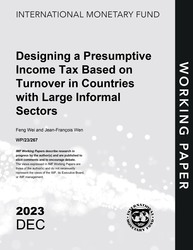
Designing a Presumptive Income Tax Based on Turnover in Countries with Large Informal Sectors
Designing a Presumptive Income Tax Based on Turnover in Countries with Large Informal Sectors
READ MORE...
Volume/Issue:
Volume 2023
Issue 267
Publication date: December 2023
ISBN: 9798400261015
$20.00
Add to Cart by clicking price of the language and format you'd like to purchase
Available Languages and Formats
| English |
Prices in red indicate formats that are not yet available but are forthcoming.
Topics covered in this book
This title contains information about the following subjects.
Click on a subject if you would like to see other titles with the same subjects.
Economics- Macroeconomics , Public Finance , Taxation - General , Economics / General , Turnover Tax , Corporate Income Tax , Compliance Costs , Informality , turnover tax rate , profit tax , policy concern , IMF working paper 23/267 , presumptive income tax , Sales tax , Presumptive tax , Tax return filing compliance , Sub-Saharan Africa
Summary
Turnover (sales) is frequently used in developing countries as a presumptive income tax base, to economize on the costs of tax administration and taxpayer compliance. We construct a simple model where a size threshold separates firms paying turnover tax from those paying profit tax (regular income tax), and where firms have the option of producing in the untaxed, informal sector. The optimal turnover tax rate trades off two policy concerns: reducing informality and avoiding strategic reductions in sales by firms seeking to remain below the threshold for the profit tax. We provide analytical results and calibrate the model to compute the optimal policy using realistic parameter values. The optimal turnover tax rate for countries with large informal sectors is found to be around 2.5% across most scenarios, while the threshold separating the turnover tax regime from profit tax lies for the most part between $65,000 and $95,000. Introducing an optimally designed turnover tax reduces the rate of informality of businesses by about 12 percentage points in the calibrated model.
Copyright © 2010 - 2026
Powered by:
AIDC



